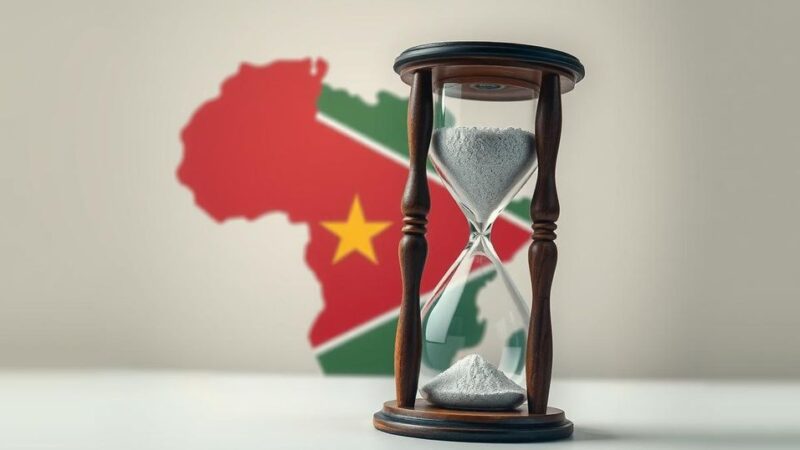A cooperative agreement on water sharing among Nile basin nations has come into effect, despite Egypt’s refusal to support it. While several nations have ratified the treaty, Egypt and Sudan have expressed concerns over potential impacts on their water rights, especially in light of Ethiopia’s ongoing dam construction. This development is poised to heighten regional tensions surrounding Nile water management.
A coalition of ten nations sharing the Nile basin has declared that a new agreement regarding equitable utilization of water resources from the Nile River has officially commenced, notwithstanding Egypt’s significant dissent. This cooperative framework’s legal status was validated by the African Union upon South Sudan’s accession to the treaty, as articulated in a statement released by the Nile Basin Initiative. Ratification of this accord has been achieved by Ethiopia, Uganda, Rwanda, Burundi, and Tanzania. Meanwhile, Egypt and Sudan have declined to endorse it, and the Democratic Republic of Congo has opted for abstention, while Kenya has yet to submit its ratification documents to the African Union. This newly activated accord symbolizes a collective ambition to maximize the benefits derived from the Nile River, ensuring its fair and sustainable use for future generations. A statement from the Nile Basin Initiative commended “the governments and people of the Nile riparian countries, and all partners and stakeholders, for their patience, resolve, and dedication to this cause.” The absence of ratification from Egypt and Sudan—countries that have voiced concerns over potential reductions in their allocations of Nile water—suggests the agreement may encounter significant controversies. Strains in regional relations have escalated, driven partly by Ethiopia’s establishment of a $4 billion dam on the Blue Nile, a crucial tributary of the Nile River. Egypt harbors apprehensions that the dam’s operation will critically undermine downstream water and irrigation supplies unless Ethiopia considers its requirements. On the other hand, Ethiopia aims to utilize the dam to generate urgently needed electricity. A vital provision of the accord stipulates that Nile basin states “shall in their respective territories utilize the water resources of the Nile River system in an equitable and reasonable manner.” The Nile River, measuring 6,695 kilometers (approximately 4,160 miles), holds the title of the longest river globally, comprised of the White Nile, which originates in South Sudan, and the Blue Nile, which begins in Ethiopia. In light of the ongoing tensions with Ethiopia, Egypt has sought to reinforce its influence in the Horn of Africa by forging a security cooperation agreement with Somalia, which stands in opposition to Ethiopia’s ambitions to secure coastal access through the Somali region of Somaliland. As per a recently struck agreement, Egypt has the potential to deploy peacekeeping forces to Somalia following the expiration of the African Union peacekeepers’ mandate in 2024. Egypt, a founding member of the Nile Basin Initiative, has traditionally upheld its claims to Nile water based on a colonial-era agreement with the United Kingdom that allocated rights to the Nile’s waters such that Egypt receives 55.5 billion cubic meters and Sudan 18.5 billion cubic meters out of a total of 84 billion cubic meters, accounting for 10 billion cubic meters lost to evaporation. This 1929 accord neglected the interests of the numerous nations along the river basin that are now advocating for a more just agreement.
The Nile River is a crucial water resource for the countries through which it flows, providing essential water supplies for agriculture, drinking, and electricity generation. The historical context of water rights stems from treaties established during the colonial era, specifically the 1929 agreement between Egypt and the United Kingdom, which favored Egypt and Sudan’s usage rights over others in the basin. There has been a growing movement among upstream nations to renegotiate these terms in favor of a more equitable distribution of resources, leading to heightened tensions, particularly between Egypt and Ethiopia, as new agricultural and energy projects are developed on the Nile’s tributaries. The current water-sharing agreement aims to advance collective efforts to address long-standing disparities in water usage among Nile basin countries.
The newly enacted water-sharing agreement among Nile basin nations marks a significant step towards addressing equity in the utilization of shared water resources. However, the non-participation of Egypt and Sudan highlights the potential for ongoing disputes that could arise due to entrenched historical claims and concerns. With regional tensions already heightened as Ethiopia proceeds with its dam project, the future of Nile water management remains fraught with challenges as nations navigate the complex dynamics of cooperation and conflict in this vital resource management scenario.
Original Source: apnews.com





